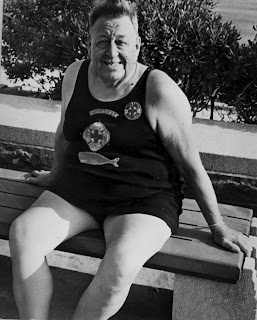Join the 2011 World's Largest Swim Lesson Team, become a Guinness World Record™ holder & encourage water safety!
WLSL 2011 takes place Tuesday, June 14th at 11 am, CST.
REGISTER NOW!
OR
Wednesday, May 18, 2011
Thursday, May 12, 2011
COMMODORE WILBERT E. LONGFELLOW (1881-1947)
Fondly called "the Amiable Whale"
Wilbert E. Longfellow, a writer for the Providence (RI) Telegram, was inspired to reverse the nation's alarming drowning rate, which, unless curbed, would assume the proportions of a national tragedy. Longfellow proposed a radical change to contemporary practice--teach water safety in water instead of on land. Practicing what he preached, he traveled around the nation teaching policemen, boy scouts and YMCA groups.
In 1905, the U.S. Volunteer Life Savings Corps recognized his work by awarding him the title of "Commodore" and, in 1910, following a remarkable recovery from tuberculosis of the spine, he was appointed to a salaried post, Commodore-in-Chief of the U.S. Volunteer Life Saving Corps.
In 1912, he presented a plan to the American Red Cross to "waterproof America." The organization adopted the plan in 1914 and proceeded to pioneer a new service entitled "water first aid." Although the American National Red Cross' Life Saving Corps was part of the First Aid Department, it was years before the Commodore earned a first-aid certificate because the doctors teaching first aid "were so busy with their program and I with mine that our paths seldom crossed."
Longfellow died on March 18, 1947, three months after his retirement. To the end, his slogan remained: "Every American a swimmer, every swimmer a lifesaver!"
Friday, May 6, 2011
BOATING SAFETY
With the kids almost out of school and Memorial Day in just a few weeks boating may be in your future. Here are a few tips to keep you and your loved ones safe while enjoying the beautiful lakes and rivers of central Texas:
· Learn to swim. The best thing anyone can do to stay safe in and around the water is to learn to swim. This includes anyone participating in any boating activity. The American Red Cross has swimming courses for people of any age and swimming ability. To find a provider of American Red Cross Learn to Swim lesson click here.
· Alcohol and boating don't mix. Alcohol impairs your judgment, balance, and coordination -- over 50 percent of drownings result from boating incidents involving alcohol. For the same reasons it is dangerous to operate an automobile while under the influence of alcohol, people should not operate a boat while drinking alcohol.
· Look for the label: Use Coast Guard-approved life jackets for yourself and your passengers when boating and fishing.
· Develop a float plan. Anytime you go out in a boat, give a responsible person details about where you will be and how long you will be gone. This is important because if the boat is delayed because of an emergency, becomes lost, or encounters other problems, you want help to be able to reach you.
· Find a boating course in your area (U.S. Power Squadron, the U.S. Coast Guard Auxiliary, US Sailing, etc) -- these courses teach about navigation rules, emergency procedures and the effects of wind, water conditions, and weather.
· Watch the weather: Know local weather conditions and prepare for electrical storms. Watch local news programs. Stop boating as soon as you see or hear a storm.
Be safe!
- Denise Blok
Subscribe to:
Posts (Atom)






